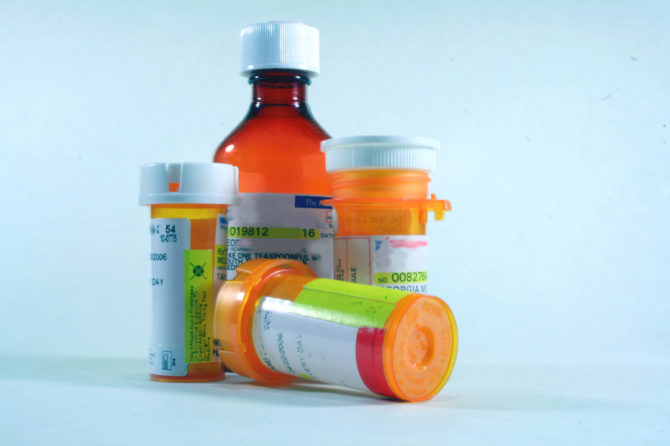
Politicians Fight Opioid Epidemic with Combination Locked Pill Bottles
Lawmakers are scrambling to find effective solutions to help curb the opioid crisis that is ravaging the U.S., though some of the solutions are getting creative. Two politicians from Tennessee, Senator Richard Briggs, and Representative Matthew Hill have introduced the Pilfering Prevention Act, which is intended to help prevent prescription opioid medications from ending up in the hands of anyone besides the prescribed patient.
This bill outlines a plan to require combination locking pill bottles to be used to distribute opioid prescription medications—as well as benzodiazepines and stimulants—in the state of Tennessee. The hoped-for outcome is that these bottles will restrict access to the medications for adolescents, as well as make it more difficult to sell prescriptions illegally.
Senator Richard Briggs says of the bill,
Too often well-meaning Tennesseans are completely unaware of the highly addictive, and potentially lethal, prescriptions drugs sitting in the family medicine cabinet. This is where drug addiction starts, and often where accidental overdoses occur. These drugs are being manufactured and prescribed in record numbers, and so it shouldn’t be a surprise that drug-related deaths are at an all-time high in Tennessee. We must explore every tool to combat this epidemic, and my bill is a practical and important step in the right direction.
Regarding the need for the Pilfering Prevention Act, Representative Hill says,
Currently, there is little distinction between the way commonly-prescribed drugs and highly-addictive and dangerous drugs are dispensed in Tennessee. If we’re going to be serious about addressing our obvious prescription drug problem in Tennessee, we have to implement safeguards that differentiate certain dangerous prescriptions and divert the possibility of abuse. That’s what my bill aims to do.
Similar bills have been attempted in Michigan, Colorado, and Maryland, but ultimately have failed to pass.
The Details of the Pilfering Prevention Act
Many opioid and prescription drug addictions begin in adolescence when teens start by stealing a few pills from the medicine cabinets of their parents or the parents of their peers. Teens are 9 times more likely to steal pills than to buy them, which is why the lawmakers are interested in preventing this theft from occurring.
Opioid addiction often starts in the medicine cabinet, argues members of the statewide coalition “Secure Tennessee’s Opioid Prescriptions” (STOP), and it’s very rare that anyone skips the gateway of prescription drugs to jump straight into heroin use. They back this bill because it aims to close this path to opioid addiction for many adolescents.
Specific medications, including opioid pain medications, benzodiazepines, and stimulants, would be required to come in combination locked pill bottles under the new law. Patients who are prescribed these medications would be issued a secret PIN to unlock the bottle. The increased costs of these bottles are expected to be passed back to drug manufacturers—a solution to the issue that caused similar bills in other states to fail.
Currently, these medications are issued in the same child-proof pill bottles that most prescriptions are packaged in. The initial design of these bottles was to deter young children from gaining access to prescription medications when they first hit the market 50 years ago, but they weren’t intended to prevent teenagers from accessing medications without their parents’ knowledge.
Anti-drug abuse advocates and medical professionals are endorsing this bill as a step in the right direction to address the start of opioid addiction and restrict access for many teens—but is it enough?
Is the Pilfering Prevention Act a Real Solution?
Critics of the bill have accused it of being a band-aid on a much bigger issue. The attitude of the bill is that it will prevent opioid addiction by preventing teens from accessing these medications, but it ignores the reality that opioid medications are easy for teens and children to get ahold of.
Others are concerned that a plastic pill bottle isn’t actually an effective deterrent to prevent pill theft. The bill’s sponsors, however, are quick to explain that the purpose of the bill isn’t to stop determined drug addicts—it’s intended to prevent teens and children from taking just a few pills at a time from their parents’ prescriptions.
“What we’re doing now is little steps. This lockable pill vial is a little step, but it might keep some teenagers from becoming addicted.” Senator Riggs says.
Locking boxes and bags for pills aren’t a new concept, but they are an extra step that many patients simply just don’t think to take. By making these locking caps mandatory, legislators are hoping to make sure that all opioid medications are controlled, without requiring any extra steps on the patients’ part.
While taking steps to address the opioid epidemic is needed, it’s clear that far more sweeping reforms are needed to address the issue than locking pill bottles. Critics of the bill point to Portugal’s historic decriminalization of all drugs, which had incredible effects on the country’s crime rates, overall population health, and more.
Tennessee is taking other steps to restrict access to opioid medications, including shutting down “pill mill” pain clinics, offering increased opportunities for residents to safely discard of old medications, and instituting more oversight over opioid prescriptions.
Struggling with an Opioid Addiction? You’re Not Alone.
There are few things more devastating than watching someone you love battle an opioid addiction. If you or a loved one is struggling with addiction, you should know that you have options. At Windward Way, our addiction treatment team will work with you to find the best possible substance abuse treatment options for you. We’re on your side, every step of the way.
Want to know more? Contact our offices today.
Leave a reply